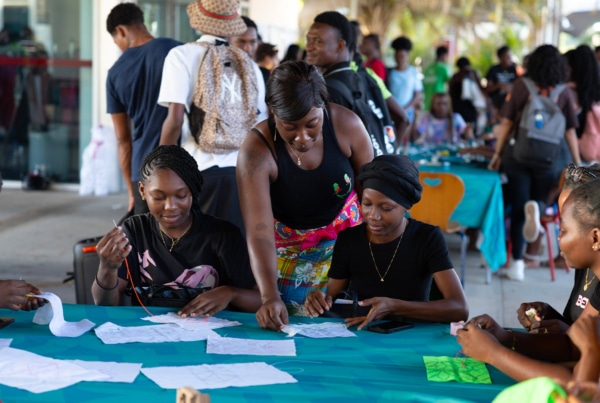The Common Documentation Service (SCD) has won the "AMI EMERGENCES" call for projects. This concerns the development of a distance learning module on intellectual property and plagiarism, which will be offered to all UG students, from undergraduate to doctoral level.
D ince it was set up, the University of Guyana's Common Documentation Service (SCD) has embarked on a gradual overhaul of its teaching and has introduced a new, active and innovative teaching dynamic. To this end, nine educational games and a comic strip have been created to help students learn how to search for documents. Building on this experience, the SCD is now embarking on the development of a distance learning module on intellectual property and plagiarism, which will be offered to all UG students, from undergraduate to doctoral level. This project was submitted to the AMI Emergences call for projects, which agreed to support it to the tune of €58,000 over two years. The project is supported by the French Ministry of Higher Education and Research.
Plagiarism is a recurring problem at national and international level, undermining the quality of degrees awarded by universities and sabotaging confidence in scientific research. This is why all the content produced will be freely distributed on the Zenodo open archive and on the national online teaching platform Callisto, run by the GIS URFIST network. It will be shared under a free Creative Commons BY NC SA licence, and each institution will be free to re-use it in whole or in part, provided that the University of Guyana is cited.
The teaching module will alternate between four instructional videos (or series of short instructional videos lasting around 10 minutes) and three video games, so that the skills acquired can be put into practice. These theory videos will be divided into four themes: I. Intellectual property 2. Plagiarism 3. Writing a bibliography 4. Bibliographic reference management software. They will be based on courses already developed by the UG's SCD, and which have been the subject of numerous face-to-face presentations. The scripts for the videos and the videos themselves will be reviewed and corrected before and after the course by Rose-Marie Borges, Senior Lecturer in Private Law at the University of Clermont Auvergne (for videos relating to legal issues: videos 1 and 2) and by Annaïg Mahé, Senior Lecturer in Information and Communication Sciences at the Unité Régionale de Formation à l'Information Scientifique et Technique (URFIST) in Paris (for videos relating to issues concerning Scientific and Technical Information: videos 3 and 4).
As far as video games are concerned, the University of Guyana has signed an agreement with the "Games for Citizens" association (under the French law of 1901), which currently has more than 20 partner universities and is supported by Sorbonne Université, the MEN and the MESRI. The aim of this consortium is to support the video game projects of partner institutions by pooling their strengths and resources - in particular by maintaining a permanent team of video game professionals (game designers, graphic artists, developers, etc.). Within this platform, the University of Guyana wishes to develop two new games on the theme of intellectual property and plagiarism, and to personalise the questions of the Masters Quiz game already available.
In addition to the French version, these games will have English, Spanish and Portuguese versions, the main languages of Latin America. Since 2015, the UG's International Relations Vice Presidency has signed agreements with dozens of South American universities, mainly in Guyana, Suriname and Brazil. There are also agreements with African universities, particularly in Senegal. The creation of these games in several languages will make it possible to promote these productions internationally, and to establish a link between the UG's Common Documentation Service and the libraries of these other universities for future cooperation. The module is scheduled for release in early 2024.




